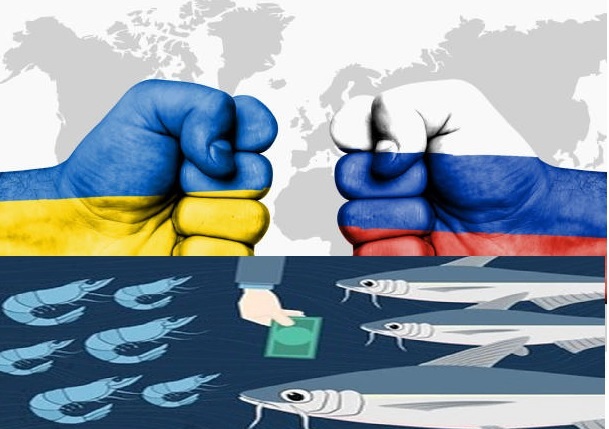(seafood.vasep.com.vn) The Russia-Ukraine crisis, culminating in the invasion into Ukraine on February 24, has become front of mind for people around the world. The world fisheries industry is also reeling in this war.
 Russia - Ukraine conflict: Opportunities - Challenges for Vietnam fishery?
Russia - Ukraine conflict: Opportunities - Challenges for Vietnam fishery?
The world whitefish industry will certainly be impacted by this conflict. Russia possesses an advantageous position in fishing and is currently the world's leading supplier of whitefish, mainly pollock and cod. Russian fish is widely consumed in the EU, Japan, the US and South Korea. In addition, a majority of Russian fish is also processed in China and exported to these markets.
In response to Russia's actions with Ukraine, many countries around the world, including the US, EU nations, UK... all strongly condemned and implemented sanctions against Russia, which’s gonna exert significant impacts on the supply - demand and world trade in seafood.
The trade between seafood importers and Russia was interrupted after the EU announced the list of the banks that would be removed from the messaging system of the Society for Worldwide Interbank Financial Telecommunications (abbreviated as SWIFT). SWIFT is used for approximately 70% of money transfers within Russia. However, customers can still make transaction with Russian seafood companies through private banks or smaller banks. Additionally, Russia's banking transactions with China are not affected because China has its own system.
Spain has imposed sanctions against Russia, which bans imports and exports, and also prohibits Russian ships from docking in Spanish ports and ports of other EU members. Moreover, Russians are not allowed to join in the Seafood Expo Global in Barcelona in April 2022.
On March 11, US President Joe Biden announced that he would sign a decree banning the import of Russian seafood and removing Most Favored Nation (MFN) treatment for Russia. Although the repeal of Most Favored Nation seems to be less severe as compared to the seafood import ban, it could still have long-term effects.
The British government recently implemented a trade embargo with Russia, and simultaneously applied an increase of 35% in the new import tax on hundreds of major Russian products. Russian whitefish are also among the products subject to increased tariffs.
Beside worries about sanctions, the biggest concern is that retailers follow public opinion and boycott products from Russia.
Several major US seafood restaurant chains have stopped sourcing seafood from Russia after the conflict in Ukraine.
UK retail supermarkets are also phasing some Russian fish products out of their shelves, including frozen pollock, frozen pink salmon and fresh cod loin products.
In addition to the direct effects on Russia - the major source of seafood, this conflict also causes the world seafood supply chain to be more unstable. Overnight surge in fuel prices continuously leads to a sharp increase in input costs for seafood production and export, especially exploited seafood. The aquaculture feed market is also encountering the risk of shortage and price increases as Russia is currently a major grain supplier in the world.
More challenges than opportunities for Vietnam fishery sector
Russia accounts for only 2% of Vietnam's seafood exports, mainly with shrimp, pangasius, surimi, tuna, yellowtail, anchovies...
In 2021, Vietnam's seafood exports to Russia reached 164 million USD, increasing by 21% compared to 2020. Vietnam also accounts for about 2% of the seafood market share in Russia.
There are still a lot of opportunities and expansion to the Russian market will be possible if the war doesn’t erupt, making many exporters to Russia stand still. Many shipments to Russia have been forced to turn back. Trade was delayed or had to be halted because of the bank's payment risk, yet finding alternative banks is not simple and cannot be solved overnight.
The pressure of war in Ukraine even higher intensifies as transportation costs, which are already immensely high during Covid-19 outbreak, keep increasing. Export enterprises struggle hard because they cannot arrange containers, and even if they can, they are always anxious about cancellation.
The burden of costs and raw materials is going to be much heavier when a series of fishing boats in coastal provinces can not put to the sea because of the high price of fuel. In aquaculture areas, farmers and fishermen are also struggling to bear the pressure of increased transportation costs on food prices, seed prices, etc.
The country's seafood exports by the end of February still grew strongly, exceeding 1.5 billion USD, up 51% on the corresponding period in 2020; in which, exports to Russia were worth 25.4 million USD, up 17% .
Particularly in February, seafood exports grew strongly by 62%, reaching 635 million USD. While exports to all markets surged by 2 to 3 digit growth rates, sales to Russia decreased by nearly 3% although conflicts only occured in the last days of the month, which clearly exhibits an immediate impact on seafood exports to Russia.
However, in response to the sanctions against Russian seafood, Vietnamese enterprises also glimmered a little opportunity to gain market share of Russia in whitefish importing countries such as the US, EU...even though pangasius can not completely replace pollock, cod.
In this context, exports to Russia are forecasted to continue to decline in March and the upcoming months if the Russia-Ukraine conflict is not resolved. Therefore, seafood exports in general can hardly maintain the growth rate as in the first two months of the year.
Please register for the Thematic report "Russia-Ukraine Conflict: Impact Assessment on Vietnam's Seafood Trade" to learn more about Vietnam's seafood trade with Russia and Ukraine as well as the influence on Vietnam's seafood trade. Contact by email: nguyentrang@vasep.com.vn
Compiled by Khanh Linh